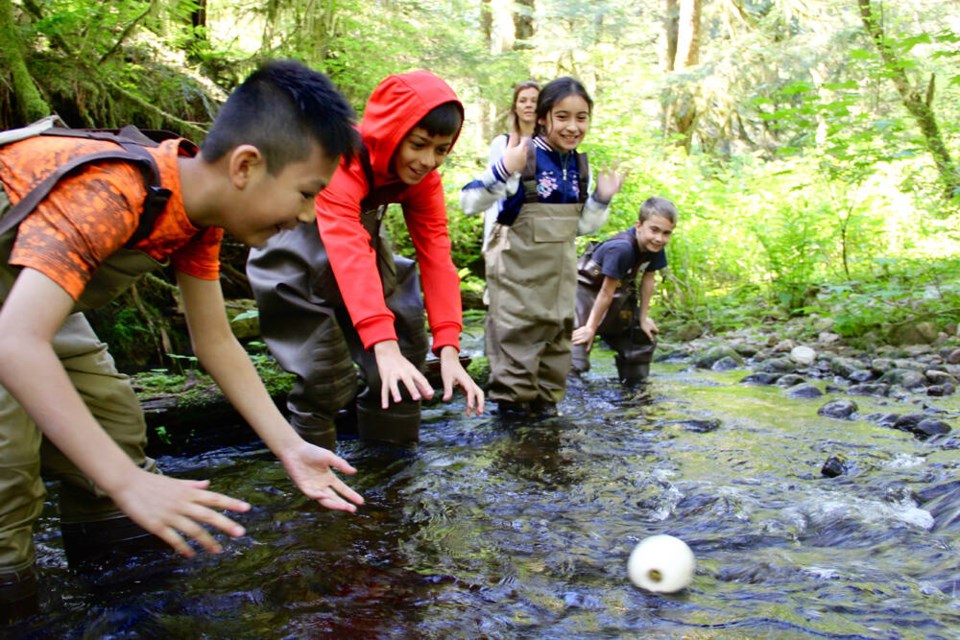It won’t be long now. The Seymour River will be a flurry of activity although this time, it won’t be the returning salmon and steelhead trout bringing the river to life.
Gently Down the Seymour, a program that has brought thousands of Metro Vancouver kids up close with the salmonid-bearing creek, is returning after three years of COVID-19-related cancellations.
The B.C. Wildlife Federation will be bringing in about 1,250 students this spring, one classroom at a time, to don hip waders on one of the Seymour’s tributaries, hunt for signs of the invertebrate life, take measurements, and learn about the life cycle of the amazing species that spawn there.
“Teaching kids about salmon covers so much more than fish,” said Chris Lim, youth program manager for the federation. “Salmonids are an integral part of the riparian food web. They affect and are affected by everything in the stream environment including overhanging plants, insect populations, predators like eagles and bears, and even abiotic factors like rocks, temperature, and pH. By protecting salmonids, we create a better environment for all the other species that use our streams.”
Shaun Hollingsworth, president of the Seymour Salmonid Society, the main stewardship group on the Seymour, beams when he thinks about the “return” to the river of a different kind.
“It feels like we’ve got the pandemic behind us and I’m just thrilled to get up there with some of those students and see the looks on their faces,” he said.
More than a practical understanding of salmonids, their habitat and their place in the environment, Hollingsworth said he sees value in the program, helping to create a bond between urban kids and nature, perhaps for the first time.
“They live in highrises. They get out, put on a pair of waders and touch it, feel it, and really get involved with the environment and they take ownership,” he said. “There’s a lot of emotion shown by these kids, because they’re out of a classroom, they get to get up into the Seymour Conservation Reserve … For a lot of kids, it’s the first time they’ve ever experienced that.”
The students are returning to the Seymour River at a unique time in its history. In 2014, a naturally occurring rock slide choked the river to a trickle, making fish passage impossible. The salmonid society kept the runs alive by trapping returning fish and trucking them to the hatchery while they led an initiative to slowly break apart the 50,000 tones of granite that fell and open up safe passageways for fish.
That work is now complete.
“It’s not the canyon of old but we believe that we’ve got good fish passage,” he said.
The fall of 2022 was a stressful time for salmonids and their human advocates alike as prolonged drought cut returning fish off from their spawning grounds. Hollingsworth said they faced calls to intervene again but he said a natural solution is most likely the best one. The fish simply waited for the rains to come, pushing back the usual spawning window by a couple months.
“We had fish spawning, even into the early new year, which is late for us, but we had tremendous, tremendous waters for the fish,” he said.
Based on the numbers of they’ve tracked so far, it appears 2022 will be a down year for successful salmon returns, but Hollingsworth said their volunteers are still out counting carcasses along the shoreline.
When it comes to what the wider community can do to support salmonids, Hollingsworth said the best advice is to simply stop interfering with them and their habitat at critical times.
“Mother Nature or the Creator will look after the fish,” he said. “We should just stand back and watch them and be amazed at what’s transpiring here in our backyard.”
Teachers who want to register their classes for Gently Down the Seymour can do so through the salmonid society's website.



